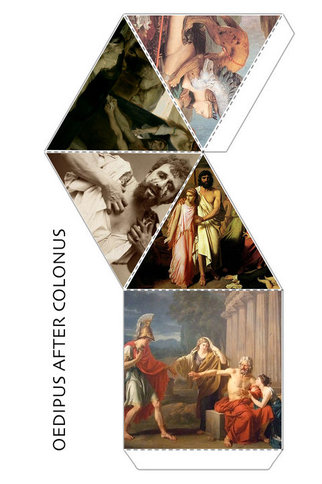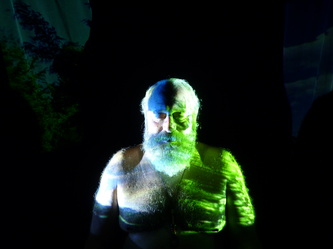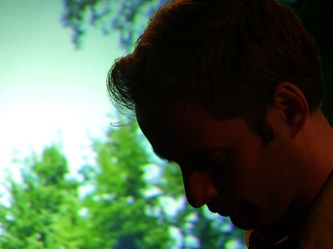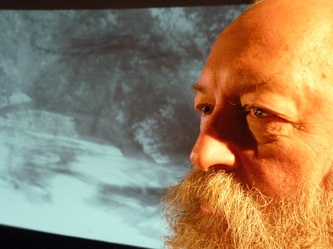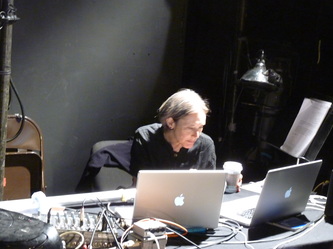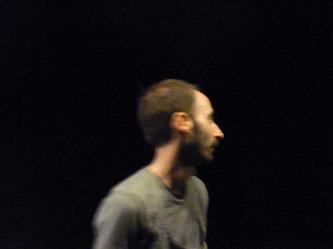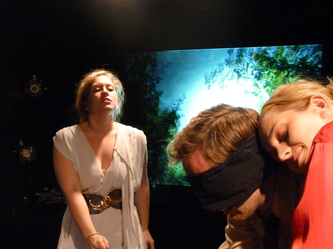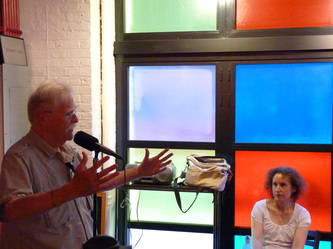Oedipus after Colonus
2010
Writer Robert Kelly
Director Crichton Atkinson
Outside of time, in the center of an imagined pine grove, the audience enters the mind of Oedipus at the instant of his death. We watch his construct of a family for the last time before he continues out of life and myth. In this mental location unconsciously crafted by the post-Freud Oedipus, his daughters extract reasoning about the sudden disappearance of their father from a young messenger. Unable to wrap his tongue around the unknown, the messenger is abused by Oedipus' daughters who demand to know what no one could see: what happened when their father was snatched out of life by the Gods? The messenger echos all youthful poets trying to describe the mystical realms between the lines of logic. Sophocles ended 'Oedipus at Colonus' with an old man wandering out of sight and disappearing. What God took Oedipus? And where was he stolen away to? We are left wondering. In the end the audience should be interested in everything that is yet to said or made by them or anyone, we should all be inspired to be messengers of things we don't really know. The daughters of Oedipus misdirect their anger and sexual demands, surging with desire to know who they are but discovering that they already have the answer.
The text allows the audience to poetically wander through the actions and objects of the stage. The young messenger is surrounded by pine trees, perhaps Evergreens, like we put up at Christmas to remind us of Christ, or more accurately as an allusion to the eternal. A slight immortality is allotted to writers and thinkers whose thoughts are in dialogue with the living; people whose reasoning strikes a chord of truth live on in those they touch. Oedipus comes back to life at the end of the play, resurrected like the old poets walking inside us as we read them. It is in thanks to their work that the next generation is inspired to write that which has yet to be said. Oedipus tells the messenger to deliver his story to every corner of the world, saying a well spent life is one where we always have news worth hearing. Oedipus challenges all of us to organize the chaos we encounter with the solidity of language. Whatever we choose to talk about describes us more than our subject, speaking is the trace of our logos, the internal logic of our reasoning.
Music by Brenda Hutchinson
Brenda was recently featured in the MOMA's Music 3.0 show, you can find a sample of her work at sonicportraits.org or on UBUweb.
Video by Andrew Lush
Additional Video by Richard Gartrell
Assistant Director Joey Vanacore
Carey Harrison as the Old Man
Zoe Morris as Ismene
Richard Saudek as the Messenger
Joanne Tucker as Antigone
Colista Turner as the Chorus
2010
Writer Robert Kelly
Director Crichton Atkinson
Outside of time, in the center of an imagined pine grove, the audience enters the mind of Oedipus at the instant of his death. We watch his construct of a family for the last time before he continues out of life and myth. In this mental location unconsciously crafted by the post-Freud Oedipus, his daughters extract reasoning about the sudden disappearance of their father from a young messenger. Unable to wrap his tongue around the unknown, the messenger is abused by Oedipus' daughters who demand to know what no one could see: what happened when their father was snatched out of life by the Gods? The messenger echos all youthful poets trying to describe the mystical realms between the lines of logic. Sophocles ended 'Oedipus at Colonus' with an old man wandering out of sight and disappearing. What God took Oedipus? And where was he stolen away to? We are left wondering. In the end the audience should be interested in everything that is yet to said or made by them or anyone, we should all be inspired to be messengers of things we don't really know. The daughters of Oedipus misdirect their anger and sexual demands, surging with desire to know who they are but discovering that they already have the answer.
The text allows the audience to poetically wander through the actions and objects of the stage. The young messenger is surrounded by pine trees, perhaps Evergreens, like we put up at Christmas to remind us of Christ, or more accurately as an allusion to the eternal. A slight immortality is allotted to writers and thinkers whose thoughts are in dialogue with the living; people whose reasoning strikes a chord of truth live on in those they touch. Oedipus comes back to life at the end of the play, resurrected like the old poets walking inside us as we read them. It is in thanks to their work that the next generation is inspired to write that which has yet to be said. Oedipus tells the messenger to deliver his story to every corner of the world, saying a well spent life is one where we always have news worth hearing. Oedipus challenges all of us to organize the chaos we encounter with the solidity of language. Whatever we choose to talk about describes us more than our subject, speaking is the trace of our logos, the internal logic of our reasoning.
Music by Brenda Hutchinson
Brenda was recently featured in the MOMA's Music 3.0 show, you can find a sample of her work at sonicportraits.org or on UBUweb.
Video by Andrew Lush
Additional Video by Richard Gartrell
Assistant Director Joey Vanacore
Carey Harrison as the Old Man
Zoe Morris as Ismene
Richard Saudek as the Messenger
Joanne Tucker as Antigone
Colista Turner as the Chorus
